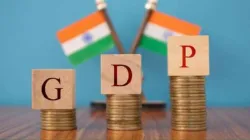Economic experts analyse Rs 2.59 lakh crore discrepancy in India's GDP estimates for 2023-24
The NSO's initial estimates for this fiscal year also disclose that the country's Gross Value Added (GVA) is projected to grow at 6.9% in 2023–24, a decrease from the 7% recorded in 2022–23.

In a significant development, the National Statistical Office (NSO) released its first advance estimates of national accounts on Friday, revealing discrepancies in the computation of India's Gross Domestic Product (GDP) for the fiscal year 2023–24. The reported discrepancies amount to Rs 2.59 lakh crore, a notable shift from (-) Rs 3.80 lakh crore in 2022–23 and (-) Rs 4.47 lakh crore in 2021–22, raising concerns among economic experts.
The NSO's data indicates that India's GDP is projected to grow at 7.3%, slightly surpassing the 7.2% recorded in the previous fiscal year. However, the discrepancy in the statistical GDP data, reflecting variations in national income under the production and expenditure methods, has become a focal point for analysis.
Experts acknowledge that some level of discrepancies in national accounts is inevitable due to delays in information reporting by various agencies, including state governments. Despite this, concerns arise from the higher-than-expected level of disparities in the national accounts data for the current fiscal year. Experts argue that while discrepancies are essential for reporting data as accurately as possible, the government must exert efforts to minimize these variations.
Three primary methods govern the computation of national income: production, expenditure, and income. Conversely, GDP growth is anticipated to be 7.3%, surpassing the 7.2% of the previous fiscal year.
It's crucial to note that GDP, which represents the total economic output of a country, is computed as the Gross Value Added (GVA) plus the net of taxes. The complexity of these computations underscores the significance of accurate national accounts in shaping evidence-based policy decisions in the country.
Economic experts emphasize the need for the government to address and mitigate these discrepancies to ensure a more accurate representation of India's economic landscape. The discrepancy in GDP estimates not only affects economic forecasting but also has implications for policy formulation and resource allocation. As India aims for sustained economic growth, the accuracy and reliability of its GDP estimates become paramount for informed decision-making and fostering a robust economic environment.
Also read | Budget 2024: What is Economic Survey of India? | Here's all you need to know